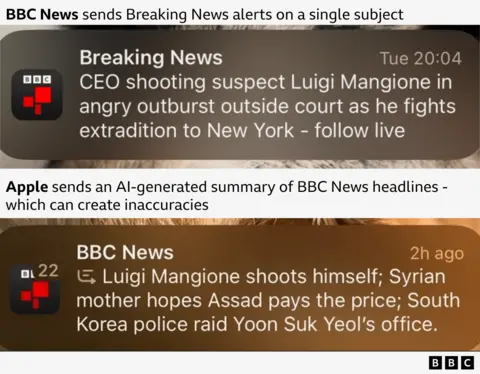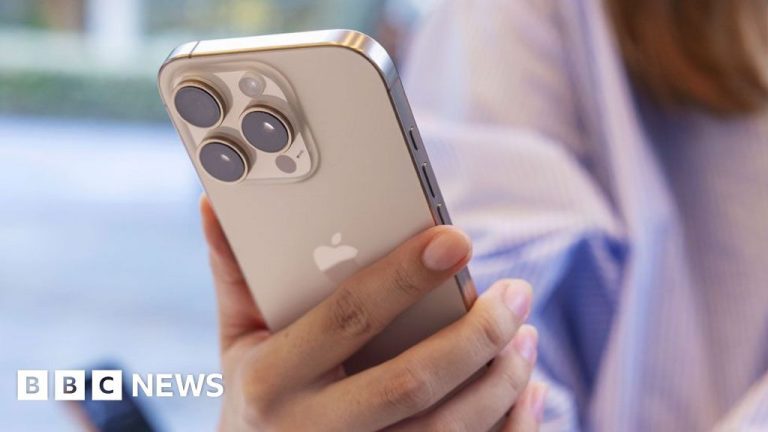

Apple is facing new calls to remove its controversial artificial intelligence (AI) feature that has generated inaccurate news alerts on its latest iPhones.
The product is intended to summarize breaking news notifications, but has in some cases made up entirely false claims.
The BBC first complained to the tech giant about the distortion of its journalism in December, but Apple only responded on Monday this week, when it said it was working to clarify that the summaries were generated by AI.
Alan Rusbridger, the former editor of the Guardian, told the BBC that Apple needed to go further and withdraw a product that he said was “clearly not ready”.
Mr Rusbridger, who also sits on Meta’s oversight board which reviews appeals against the company’s content moderation decisions, added that the technology was “out of control” and posed a considerable risk of misinformation.
“Trust in information is already low enough without major American companies stepping in and using it as a sort of test product,” he told BBC Radio Four’s Today programme.
The National Union of Journalists (NUJ), one of the world’s largest journalists’ unions, said Apple “must act quickly” and remove Apple Intelligence to avoid misinforming the public – echoing previous appeals from the journalistic organization Reporters Without Borders (RSF).
“At a time when access to accurate information has never been more important, the public must not be put in a position to doubt the accuracy of the information they receive,” said Laura Davison , general secretary of the NUJ.
RSF also deemed Apple’s intervention insufficient and reiterated its request for withdrawal of the product.
Series of errors
The BBC complained last month, after an AI-generated summary of its headline falsely indicated to some readers that Luigi Mangione, the man accused of killing UnitedHealthcare CEO Brian Thompson, had committed suicide.
Apple’s AI inaccurately summarized BBC app notifications on Friday claim that Luke Littler had won the PDC World Darts Championship hours before it started – and Spanish tennis star Rafael Nadal had revealed his homosexuality.
This is the first time Apple has officially responded to concerns raised by the BBC about the errors, which appear to come from the organization’s app.
“These Apple summaries do not reflect – and in some cases completely contradict – the BBC’s original content,” the BBC said on Monday.
“It is essential that Apple addresses these issues urgently, because the accuracy of our information is essential to maintaining trust.”
The BBC is not the only news organization affected.
In November, a ProPublica reporter highlighted erroneous Apple AI summaries of alerts from the New York Times app suggesting that it had reported that Israeli Prime Minister Benjamin Netanyahu had been arrested.
Another inaccurate summary of a New York Times article appears to have been published on January 6, regarding the fourth anniversary of the Capitol riots.
The New York Times declined to comment.
RSF said the fake AI-generated headline about Mr. Mangione in December showed that “generative AI services are still too immature to produce reliable information for the public.”
On Tuesday, he said Apple’s plan to update the feature to clarify when notifications are summarized with AI to users “doesn’t solve the problem at all.”
“This only transfers responsibility to users who, in an already confusing information landscape, will have to verify whether the information is true or not,” says Vincent Berthier, head of RSF’s Technology and Journalism desk.


Apple said its update would arrive “in the coming weeks.”
He has said previously its notification summaries – which group and rewrite previews of multiple recent app notifications into a single alert on users’ lock screens – aim to allow users to “search for key details”.
“Apple Intelligence features are in beta and we are continually making improvements using user feedback,” the company said in a statement Monday, adding that receiving the summaries was optional.
“A software update in the coming weeks will further clarify when the text displayed is a summary provided by Apple Intelligence. We encourage users to report an issue if they see an unexpected notification summary.”
The functionality, as well as others released as part of its broader suite of AI tools was rolled out in the UK in December. It’s only available on its iPhone 16, iPhone 15 Pro, and Pro Max models running iOS 18.1 and above, as well as select iPads and Macs.
Apple isn’t alone in deploying generative AI tools that can create text, images, and more content at users’ request, but with varying results.
Google’s AI Presentation feature, which provides a written summary of information from results at the top of its search engine in response to user queries, came under fire last year. for producing erratic responses.
At the time, a Google spokesperson said these were “isolated examples” and that the feature generally worked well.



